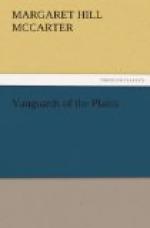At the closing of an Indian summer day we pitched our camp outside the broken walls of old Fort Bent. Every day found me near Eloise, although the same barrier was between us that had risen up the day she left me in the ruined chapel by the San Christobal River. Every day I longed to tell her what Beverly had said to me the night he—went out. It was due her that she should know how tenderly he had thought of her.
The night was irresistible, soft and balmy for the time of year, as that night had been long ago when we children were marooned inside this stronghold. A thin, growing moon hung in the crystal heavens and all the shadowy places were softened with gray tones. Jondo and Uncle Esmond and Rex Krane were talking together. Aunty Boone was clearing up after the evening meal. The soldiers were about their tasks or pastimes. Only Eloise and I were left beside the camp-fire.
“Let’s go and find the place where we spent our last evening here, Little Lees,” I said, determined to-night to tell her of Beverly.
“And just as many other places as we can remember,” Eloise replied.
We clambered over heaps of fallen stone in the wide doorway, and stood inside the half-roofless ruin that had been a stronghold at the wilderness crossroads.
The outer walls were broken here and there. The wearing elements were slowly separating the inner walls and sagging roofs. Heaps of debris lay scattered about. Over the caving well the well-sweep stuck awry, marking a place of danger. Everywhere was desolation and slow destruction.
We sat down on some fallen timbers in the old court and looked about us.
“It was a pity that Colonel Bent should have blown up this splendid fortress, and all because the Government wouldn’t pay him his price for it,” I declared.
“Destroyed what he had built so carefully, and what was so useful,” Eloise commented. “Sometimes we wreck our lives in the same way.”
I have said the twilight seemed to fit her best, although at all times she was fair. But to-night she was a picture in her traveling dress of golden brown, with soft, white folds about her throat. I wondered if she thought of Beverly as she spoke. It hurt me so to be harsh with his memory.
“Yes, Charlie Bent blew up all that the Colonel built into him, of education and the ways of cultured folks—a leader of a Dog Indian band, he is a piece of manhood wrecked. And by the way,” I went on, “Beverly shot his beautiful white horse on the Prairie Dog Creek. You should have seen that shot. It was the cleanest piece of long-range marksmanship I ever saw. He hated Bev for that.”
“Maybe he gloats over our lost Beverly to-day. He is only ‘gone out’ to me,” Eloise said softly.
“Let me tell you something, Little Lees. Beverly and I never spoke of you—you can guess why—until that last night beside the Smoky Hill. He wanted to tell me something that night.”




